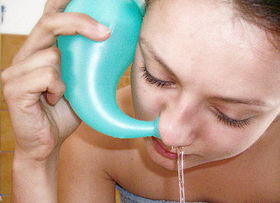Nasal irrigation
| Nasal irrigation | |
|---|---|
| Intervention | |

Woman flushing her nose with a neti pot
|
|
| ICD-9-CM | 22.0 |
| MeSH | D055556 |
Nasal irrigation, or nasal lavage or nasal douche, is a personal hygiene practice in which the nasal cavity is washed to flush out mucus and debris from the nose and sinuses. The practice is generally well-tolerated and reported to be beneficial with only minor side effects. Nasal irrigation in a wider sense can also refer to the use of saline nasal spray or nebulizers to moisten the mucous membranes.
According to its advocates, nasal irrigation promotes good sinus and nasal health. Patients with chronic sinusitis including symptoms of facial pain, headache, halitosis, cough, anterior rhinorrhea (watery discharge) and nasal congestion are reported often to find nasal irrigation to provide relief. In published studies, "daily hypertonic saline nasal irrigation improves sinus-related quality of life, decreases symptoms, and decreases medication use in patients with frequent sinusitis", and irrigation is recommended as an adjunctive treatment for chronic sinonasal symptoms.
Nasal irrigation is used for a range of sinus and nasal symptoms.
For chronic sinusitis it can be an effective add-on therapy. It is also reported to be an effective measure against chronic sinus symptoms induced by work-place exposure to sawdust. Further evidence suggests that nasal irrigation causes relief for both hay-fever and the common cold. Nasal irrigation could also be an effective treatment for allergic rhinitis and chronic sinusitis.
Daily nasal irrigation with a salt-water solution (a mixture of 0.9% non-iodized sodium chloride and either purified or filtered water warmed to around 98 degrees F/ 37 degrees C, with or without inclusion of a buffering agent such as sodium bicarbonate) has been recommended as both an add-on and primary treatment in such cases and is preferable to the use of corticosteroids except in the most serious cases of acute bacterial sinusitis. Irrigation should be used with caution in infants, as nasal drops are not widely tolerated.
...
Wikipedia
